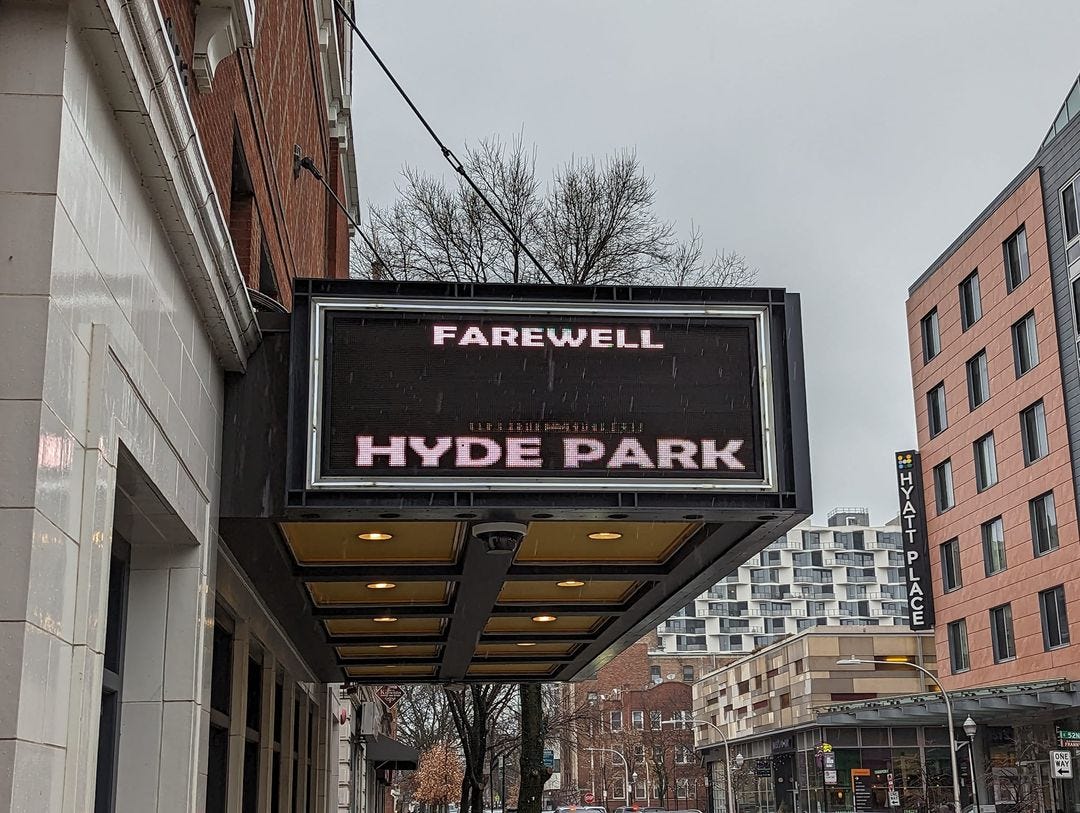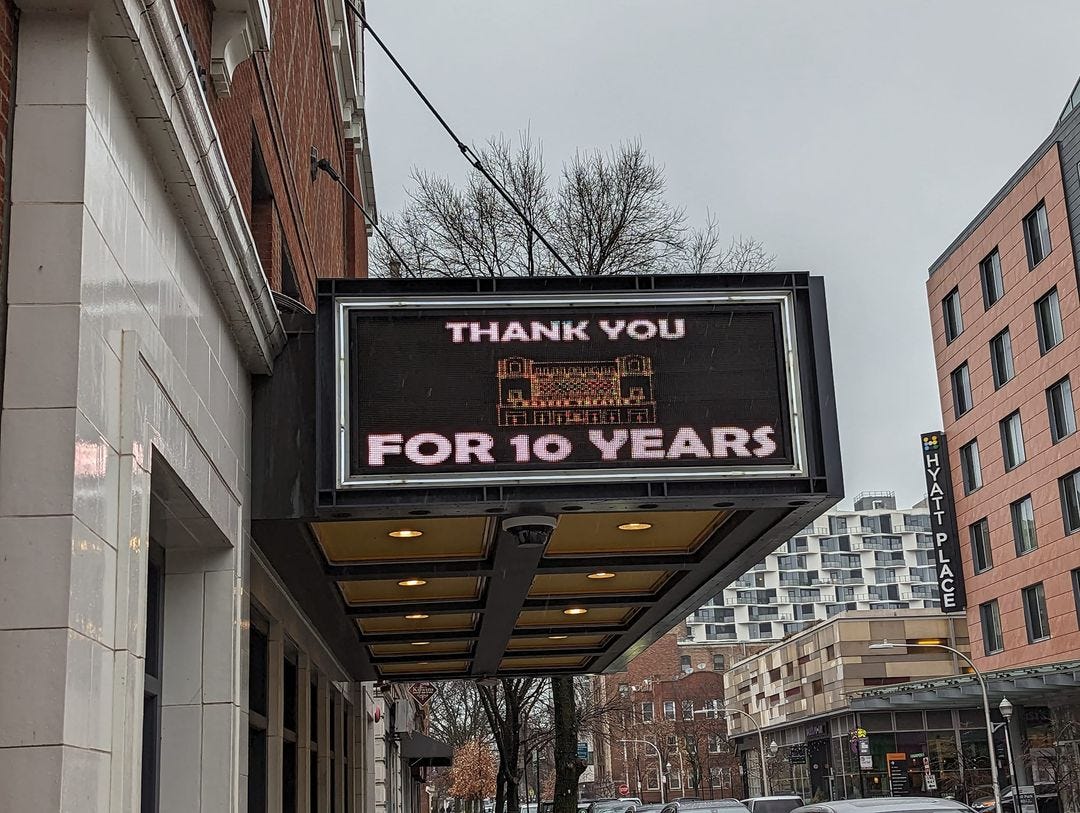My Neighborhood Movie Theater is Temporarily Closing. Here’s Why I’m Alarmed.
I recently learned that my local independent movie theater, the Harper Theater in Hyde Park, Chicago, will be closing temporarily, and I'm bummed.
Yesterday, when I saw these messages
on the theater’s marquee, I panicked.
I assumed it meant that the Harper was shutting its doors forever. When I learned that it will be reopening next year under new management, I breathed a sigh of relief.
But when I dug a little deeper as to why it’s temporarily closing, I became alarmed again. Here’s what the theater’s owner, Tony Fox, said about why he’s selling the Harper and getting out of the movie theater business:
“We definitely did not turn a profit the last couple of years . . .”
[Snip]
Fox said that it became more difficult to negotiate with studios in 2019, after the Trump administration’s Department of Justice moved to roll back antitrust case law regulating film distribution. The eventual repeal of The Paramount Decree of 1948, which placed bans on things like “block booking” (selling multiple films in a package to force theaters to play less-desirable movies), was a blow to small, independent theaters.
“They just made it harder, and harder and harder to be an exhibitor. And it was a hard business to begin with,” Fox said.
And then there was the global shutdown. Theater chains like AMC pivoted to streaming rentals to recuperate some lost revenue, while smaller theaters had to wait it out.
So, although blessedly the Harper has been granted a reprieve, that reprieve may prove temporary, given the economic realities of film exhib\tion today.
I fervently hope that the Harper not only survives, but thrives, for decades to come. Ever since the Harper was resurrected in 2012, after many years of dormancy, seeing films at the Harper has meant a lot to me.
It's not that the Harper Theater’s regular programming made it unique or irreplaceable or anything. True, they hosted an annual Afro Film series, which I and other cinephiles appreciated. But they mostly showed blockbuster-type films, which are not my thing.
On the other hand, their prices were more than reasonable, especially their dirt-cheap $5 Wednesdays, and $7 matinees.
More importantly, because Hyde Park has a big African-American population, they reliably showed many of the most important African-American films. Seeing Barry Jenkins' Moonlight—a film that incidentally made it onto the recently released Sight and Sound critics' poll of the greatest films ever made—at the Harper was an unforgettable experience. I saw other landmark African-African films there as well, including Jordan Peele’s Get Out (also on the Sight and Sound list) and Ryan Coogler’s Fruitvale Station.
The last film I saw there, Gina Prince-Bythewood’s The Woman King, was hugely enjoyable. The Woman King is exactly the kind of rousing adventure flick that greatly benefits from being seen in a theater. When I saw it,there were several moments when the audience spontaneously broke out into applause, as well as a steady stream of the audience commentary and talk back (always one of the most delightful features of seeing a film at the Harper).
Another thing I loved is that the theater is so close to my home—just a 5-minute walk away. After a day of working from home, it was glorious to be able to knock off, duck in, kick back, and see a film, without having to travel over an hour and 15 minutes minimum on increasingly unreliable public transportation to get there, as I'd have to do to see films at the Music Box or the Landmark.
So yeah, one thing I hate about the Harper closing, even temporarily, is the inconvenience factor of now having to travel longer distances to see some films.
But there are bigger issues as well. I worry a lot about the future of filmgoing as a theatrical experience. Clearly, it’s been a long-term strategy on the part of the industry to move away from celluloid and theaters and to make film watching an exclusively digital, at-home experience. Earlier this year in the pages of N+1, Will Tavlin made a persuasive, and thoroughly depressing, case for this argument, explaining that the studios’ end-game is “a monopolization of all filmmaking activity — control over production, distribution, and exhibition” as well as ‘full control over the circulation of their films in perpetuity.”
Hyde Parkers are lucky in that, even if the Harper were to permanently shut its doors, our neighborhood would hardly be a film desert. The University of Chicago’s Film Studies Center and its Logan Center for the Arts regularly host public screenings. Above all, there is the university’s mighty student-run film society, Doc Films, which, during the academic year screens a film every night. Doc recently celebrated its 90th anniversary and it remains a vital and irreplaceable institution for film lovers here.
But of course, those venues are subsidized by one of the most filthy rich universities in human history. Theaters like the Harper Theater which show mostly new films and which have to compete in a capitalist marketplace face an increasingly chilly economic climate, especially if, like the Harper, they’re small and independently run. Here in Chicago, even theaters that are partially subsidized, like the Gene Siskel Film Center, or that are part of a chain, like AMC’s River East 21, are facing steep declines in attendance. I see movies at those two theaters a lot, and at most of the screenings I’ve attended, the audiences were barely in the double digits, and often not even that.
And you know what? It’s not just the movies I worry about.I am a passionate lover of live theater, and Chicago is a great theater town. But theater companies, too, seem to be struggling. In the post-pandemic era, many theater companies here, like repertory and arthouse film theaters like Facets and the Gene Siskel, have played it safe with their programming. But live theater, too, is struggling to find an audience.
Over the past year, I’ve seen a lot of terrific theater here, almost all of it well-reviewed. But too often, audiences are sparse. Just last month, at the Court Theatre here in Hyde Park, which in June won a Tony award for excellence in regional theater, I saw an exquisitely mounted, beautifully acted production of the South African play The Island. Written by the renowned playwright Athol Fugard, this is a work that is more timely than ever, due to its themes of incarceration, racist oppression, and the necessity of fighting authoritarian, anti-democratic regimes. The Court’s production deservedly received excellent reviews, but at the Friday night performance I attended, the theater was more than half empty.
The writing is on the wall. In the post-pandemic era, venues of all sorts that depend on people getting off their asses, abandoning the safety and comfort of their homes, and mixing it up with other human beings in public, are in trouble. Here in Hyde Park, it’s not just the movie and live theaters that are suffering, it’s the restaurants, too. One by one, they are shutting down, like lights. In just the past few months, I count at least five restaurants here that have closed, or will be closing soon (Mellow Yellow, La Petite Folie, Piccolo Mondo, the Bonjour Cafe Bakery, and Native Foods). With the exception of La Petite Folie, all of those places were moderately priced; and with the exception of Native Foods, all were independently owned, non-chain restaurants that had been neighborhood staples for decades.
Even Valois, the neighborhood’s budget-friendly cafeteria-style joint that is so legendary that it was the subject of a classic ethnographic study explaining its appeal, may be in danger. In the pre-pandemic era, it used to be open until 10 o’clock every night, but now it closes at 3 in the afternoon. The place used to be positively mobbed during weekend brunch hours. When I stopped by late in the morning this past Sunday, there was barely anyone there.
The conventional wisdom on the part of the smug smart boys on the internet was that, appearances to the contrary, the covid-19 pandemic would not produce any permanent changes in American society. And in a sense, that is right. Despite the fond hopes of those of us on the left, the pandemic does not seem to have brought us a single step closer to paid sick leave, universal child care, or single payer health care, even as the outrageous need for those long-overdue policies became damningly apparent.
But though the pandemic may not have changed anything politically, on the level of our society and culture, I fear that it may have left a lasting mark, and not in a good way. For many of us, it appears to have increased the seductive allure of staying at home, where we can revel in the luxury of our creature comforts and enjoy the fantasy of being in complete control of our environment. Conversely, it seems also to have created a long-lasting, and perhaps permanent, diminishment of our public spaces and face-to-face communal activities and experiences.
That, I fear, may prove a crushing blow, not only for our culture, but also for our democracy. It seems to me that it is no accident, comrade, that the areas of the country that are most firmly in the grip of the far right are rural communities, where the population is far sparser and public spaces and institutions are far fewer and far less robust.
As the late Barbara Ehrenreich pointed out, human beings have a deep-seated need for experiences of collective joy. Movie theaters are places where many of us have found that collective joy. In a world where the good kind of collective joy that can be found in theaters is increasingly less accessible, human beings will look for other spaces and communities, both virtual and face-to-face, that provide them with a similar sense of community and connection. Some of those places will be benign or perhaps even socially beneficial and healthy, but others will be the opposite.
Given that the enforced isolation of the pandemic caused so many Americans to spend an increasing amount of time online, and that the main political effect of that was that many became lost in the fever swamps of the online far right, I am highly skeptical of the idea that participating in virtual communities is a benign substitute for participating in face-to-face communities and “meatspace” public events. Our democracy is in very bad shape, and our theaters and other public spaces are vital to maintaining its health. I strongly urge you to support them and participate in them to whatever extent you are able.




